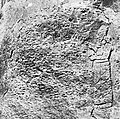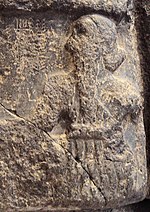Seleucus I Nicator (/sɪˈluːkəs/; Greek: Σέλευκος Νικάτωρ, Séleukos Nikátōr, "Seleucus the Victorious"; c. 358 BC – 281 BC) was a Macedonian Greek general...
63 KB (7,984 words) - 22:39, 21 December 2024
Darius the Great (redirect from King Darius I of Persia)
Darius I (Old Persian: 𐎭𐎠𐎼𐎹𐎺𐎢𐏁 Dārayavaʰuš; c. 550 – 486 BCE), commonly known as Darius the Great, was the third King of Kings of the Achaemenid...
64 KB (7,053 words) - 00:50, 14 December 2024
Nebuchadnezzar I (/ˌnɛbjʊkədˈnɛzər/ NEB-yuu-kəd-NEZ-ər; Babylonian: mdNabû-kudurrī-úṣur (AN-AG-ŠA-DU-ŠIŠ) or mdNábû-ku-dúr-uṣur, meaning "Nabû, protect...
14 KB (1,802 words) - 15:28, 31 October 2024
Ahmose I (Amosis, Aahmes; meaning "Iah (the Moon) is born") was a pharaoh and founder of the Eighteenth Dynasty of Egypt in the New Kingdom of Egypt,...
55 KB (6,643 words) - 18:44, 13 November 2024
Menmaatre Seti I (or Sethos I in Greek) was the second pharaoh of the Nineteenth Dynasty of Egypt during the New Kingdom period, ruling c. 1294 or 1290...
31 KB (3,934 words) - 16:32, 20 December 2024
Mitanni (section Parattarna I / Barattarna)
well before the time of Thutmose I, dating actually to the time of the Hittite sovereigns Hattusili I and Mursili I. Hurrians are mentioned in the private...
86 KB (10,981 words) - 08:55, 19 December 2024
marks, boxes, or other symbols instead of cuneiform script. Wahibre Psamtik I (Ancient Egyptian: Wꜣḥ-jb-Rꜥ Psmṯk) was the first pharaoh of the Twenty-sixth...
29 KB (2,843 words) - 12:01, 15 December 2024
Jemdet Nasr period (3100–2900 BC): the 9 km city wall is built Uruk II Uruk I Anu/ White Temple ziggurat Unlike the Eanna district, the Anu district consists...
78 KB (6,817 words) - 20:10, 19 December 2024
Achaemenid Empire (redirect from Teispes (I))
genealogy of the Achaemenids) the kings of Anshan were Teispes, Cyrus I, Cambyses I and Cyrus II, also known as Cyrus the Great, who founded the empire...
170 KB (17,321 words) - 21:34, 20 December 2024
Susa (section Susa I period (4200–3800 BC))
1163/9789004293915_004, ISBN 9789004293915 Marest-Caffey, Laure (2016). "Seleukos I's Victory Coinage of Susa Revisited: A Die Study and Commentary". American...
68 KB (8,015 words) - 16:06, 28 November 2024
Antiochus I Soter (Ancient Greek: Ἀντίοχος Σωτήρ, Antíochos Sōtér; "Antiochus the Savior"; c. 324/3 – 2 June 261 BC) was a Greek king of the Seleucid...
17 KB (1,537 words) - 16:14, 28 November 2024
burnt to the ground in about 145 BC. The last Greco-Bactrian king, Heliocles I, retreated and moved his capital to the Kabul Valley. In about 140–130 BC...
79 KB (9,021 words) - 23:06, 20 November 2024
Imagery as a Multicultural Expression of Royal and Divine Power Under Seleukos I Nikator". In Iossif, Panagiotis P.; Chankowski, Andrzej S.; Lorber, Catharine...
139 KB (10,567 words) - 04:39, 8 December 2024
Kushan Empire (section Kanishka I (c. 127 – c. 150))
Sakas, who moved further south. Archaeological structures are known in Takht-i Sangin, Surkh Kotal (a monumental temple), and in the palace of Khalchayan...
115 KB (11,617 words) - 14:22, 15 December 2024
right thigh and throws it in Ishtar's face, saying, "If I could lay my hands on you, it is this I should do to you, and lash your entrails to your side...
67 KB (6,784 words) - 11:32, 17 November 2024
statutes that I have commanded you, I will surely tear the kingdom from you and will give it to your servant. Yet for the sake of David your father I will not...
94 KB (12,020 words) - 09:01, 19 December 2024
of Judea during the Iron I and Iron II periods has little room for historicizing readings of the stories of I-II Samuel and I Kings. Redford 1992, pp. 301–302:...
114 KB (12,239 words) - 05:11, 20 December 2024
Tiglath-Pileser I (/ˈtɪɡləθ paɪˈliːzər, -ˌlæθ, pɪ-/; from the Hebraic form of Middle Assyrian Akkadian: 𒆪𒋾𒀀𒂍𒈗𒊏, romanized: Tukultī-apil-Ešarra,...
13 KB (1,513 words) - 13:07, 16 December 2024
Possibly named after his grandfather of the same name, or after Nebuchadnezzar I (r. c. 1125–1104 BC), one of Babylon's greatest ancient warrior-kings, Nebuchadnezzar...
91 KB (11,200 words) - 12:04, 16 December 2024
appointed me as his gardener. While I was gardener Ishtar granted me her love, and for four and (fifty?) ... years I exercised kingship. Later claims made...
89 KB (10,570 words) - 16:04, 30 November 2024
the efforts of the kings Adad-nirari I (r. c. 1305–1274 BC), Shalmaneser I (r. c. 1273–1244 BC) and Tukulti-Ninurta I (r. c. 1243–1207 BC), under whom Assyria...
98 KB (12,848 words) - 12:05, 16 December 2024
Ahmose I and Thutmose I at the beginning of the Eighteenth Dynasty, as recorded in the tombs of Ahmose, son of Ebana and Ahmose pen-Nekhebet; Thutmose I is...
98 KB (11,132 words) - 16:31, 28 November 2024
outright attacks from the aggressive Sassanids in the east. Finally, Shapur I of Persia inflicted a disastrous defeat upon the Romans at the Battle of Edessa...
33 KB (3,278 words) - 04:22, 14 December 2024
(in order to attain) appropriate behavior, I established truth and justice as the declaration of the land, I enhanced the well-being of the people." It...
23 KB (2,025 words) - 12:04, 16 December 2024
identified as Archytas of Tarentum but now considered to be Pythagoras Seleukos I Nikator, unknown locale within the villa So-called Young Commander found...
30 KB (3,313 words) - 23:40, 25 October 2024
"The black-headed peoples I ruled, I governed; mighty mountains with axes of bronze I destroyed. I ascended the upper mountains; I burst through the lower...
53 KB (6,274 words) - 22:12, 19 December 2024
Sumerians. Reliable historical records begin with Enmebaragesi (Early Dynastic I). The Sumerians progressively lost control to Semitic states from the northwest...
109 KB (12,438 words) - 11:35, 7 December 2024
Dynasty of Ur. West is at top, north at right. Gold helmet of King of Ur I Meskalamdug, c. 2600–2500 BC Mesopotamian female deity seated on a chair,...
68 KB (7,269 words) - 13:44, 16 December 2024
Oriental Institute of Chicago A brief description of the reign of Ur-Namma. I am Ur-Namma. The life and death of Ur-Namma, as told in Babylonian literature...
28 KB (3,111 words) - 01:49, 24 November 2024
Mari Iku-Shamagan (𒄿𒆪𒀭𒊭𒈠𒃶, i-ku-Dsha-ma-gan, fl. c. 2500 BC) was a King of the second Mariote kingdom. He is one of three Mari kings known from...
8 KB (638 words) - 21:48, 11 December 2024




























